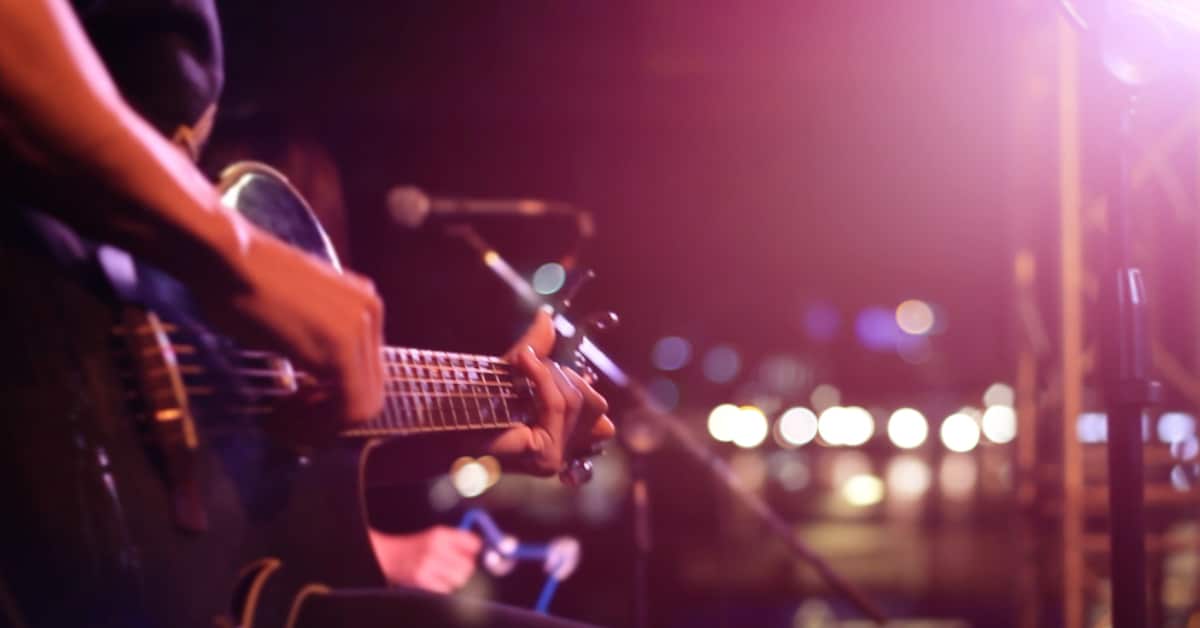Music is a great source of fun and artistry. It helps us express our deepest feelings, or have a good time. But, did you know that it can also help you learn languages?
That’s right! Music and language share some of the same parts of the brain. And both work with melodies, words, rhythm, and memory. So, if you have some music skills, they might work to your advantage when learning a language. But if you don’t, that’s okay. You just need to enjoy music and it will help you improve your language skills.
With music you’ll learn new vocabulary and expressions; improve your pronunciation, and, of course, your listening.
Plus, music is everywhere. Every country has different singers, musicians, and music genres to share with others. The Spanish music industry has always been big. It’s full of years of history and different artists. Plus, the Spanish language is one of the most spoken languages around the world.
So there are many international options to hear Spanish music from.
Now you know, if you’re looking to improve your Spanish language skills and cultural knowledge, music is a great tool. Here’s our list of the best Spanish songs to learn the future tense.
Spanish Future Tense
As the name says, the future tense is used to talk about things that will happen in the future. Or for things that you wish or believe will happen in the future. You can also use it for probabilities. In these cases, the future is used like in English.
There’s also voy a + verb in infinitive. This formula is not in the future tense grammatically, but it does express the future.
For example: Mañana voy a comer pastel. (Tomorrow I’m going to eat cake.)
It’s used to express things you currently want to do or will do in the future. Or for things you think will happen because of a current situation.
For example: El gobierno actual es tan corrupto que la inseguridad va a aumentar. (The current government is so corrupt that insecurity will increase.)
A lot of times, you can change this formula for the classic future tense conjugation.
For example: Mañana comeré pastel. (Tomorrow, I will eat cake). Or La inseguridad aumentará. (Insecurity will increase).
You can also use simple present tense to express the future. You use it with plans.
For example: Mi clase es a las ocho. (My class is at eight).
10 Songs in Future Tense to Improve Your Spanish
1. Mi Gran Noche – Raphael
He is a very famous Spanish singer. He started singing from a very young age and won the Best Child’s Voice from Europe at only 9 years old! He has accumulated international recognition throughout his 60-year career. He has sung in the most important theaters, such as Carnegie Hall (U.S.), Bellas Artes (Mexico), the Sydney Opera House (Australia), and L’Olympia (France). He’s also an actor, has participated in movies, and performed in musical theater.
He has become so important to the Spanish music industry that there’s a miniseries about his life. There’s also a docuseries titled “Raphaelismo”.
“Mi gran noche” is the perfect song to learn different Spanish verbs in the future tense. Especially verbs that are common and used every day.
Key phrases:
- Saldré por la noche (I’ll go out at night)
- Podré... (I’ll be able to…) – He uses this verb with multiple verbs. So it’s perfect to learn different actions – Podré vivir (I’ll be able to live), Podré cantar (I’ll be able to sing), Podré reír y soñar y bailar (I’ll be able to laugh, and dream, and dance).
- ¿Qué pasará? (What will happen?)
- Caminaré (I’ll walk)
- Olvidaré la tristeza (I’ll forget sadness)
Enjoy the Music Video:
2. Me Va A Extrañar – Ricardo Montaner
Ricardo Montaner is a well-known Argentinian singer and nationalized Venezuelan. He has had a great impact on Spanish music with his pop ballads. But he also sings other genres, as he most recently proved with his latest album “Tango”. He has won many awards, including a Latin GRAMMY for his Musical Excellence. He was also named the 43th greatest Latin artist of all time, according to Billboard.
This song is the perfect example of the future tense expressed with the verb periphrasis “ir + verb in infinitive”. He sings, me va a extrañar (he/she is going to miss me). This phrase expresses the future without any verb conjugated in that tense.
Don’t worry, it does have some verbs conjugated in the future. Another good thing is that the future verbs are in the chorus, therefore you’ll hear them many times. Repetition is good to memorize and truly understand something.
Key phrases:
- Sentirá (She/He will feel something)
- Será por mí (It will be because of me)
- La hará sufrir (Something or someone will make her suffer)
Enjoy the song:
3. Amante Bandido – Miguel Bosé
Miguel Bosé is a singer from Panama, nationalized Spanish, Colombian, and Italian. In 2013, the Latin Recording Academy named him Person of the Year. He also won a Latin GRAMMY in 2002 for Best Male Pop Vocal Album. He has published many albums; Andy Warhol even made the cover for his “Made in Spain” album.
“Amante bandido” is one of his hit songs. Its catchy rhythm and repetitive chorus will make you memorize the lyrics easily. This means it will also be easy for you to memorize the verbs in the future tense.
Key phrases:
- Seré (I will be…)
- No dirás que no (You won’t say no)
- Me perderé (I’ll get lost)
Enjoy the music video:
4. Tiempos Mejores – Yuri
Yuri is a famous Mexican singer. She has had a successful career of more than 40 years and has sold millions of albums. She was nominated for a GRAMMY Award, and in 2018 received the Latin Grammy Award for her Musical Excellence. She recorded the Spanish version of the classic song “Karma Chameleon” by Culture Club.
“Tiempos mejores” is one of her most popular songs. It is about hoping that things will get better, both in the singers’ life and in the world. So, it’s a good song to learn how to use the future tense to talk about things that you want and believe will happen.
Key phrases:
- Algún día lo lograré (One day I’ll make it)
- Vendrán tiempos mejores (Better times will come)
- Algún día lo encontraré (One day I’ll find it/him)
- Les diré (I’ll tell them)
Enjoy the music video:
5. Si Juras Regresar – Enrique Iglesias
He is a worldwide famous Spanish singer. At the beginning of his career, he became popular for his heartfelt ballads. Nowadays he’s also very well-known for his dance-pop music too. He has also dabbled in urban music. He has many achievements, including most number-one singles on Billboard’s Hot Latin Songs Chart, with a total of 27. He has one GRAMMY Award for Best Latin Pop Performance and five Latin GRAMMYs. He also ranked number one on Billboard’s Greatest of All Time Latin Artists list.
“Si Juras Regresar” is a song from his debut album, which was very successful. The song is about someone that will be there for his/her lover if the other person swears to come back. It has many Spanish verbs in the future tense. So it’s great to expand your vocabulary of verbs.
The verses are very small, so it’s easy to understand and memorize; a simple but beautiful song.
Key phrases:
- Te creeré (I’ll believe you)
- Te esperaré (I’ll wait for you)
- Aquí estaré (I’ll be here)
- Ni el tiempo nos separará (Not even time will pull us apart)
Enjoy the song:
6. Ya Pasará – Carlos Rivera
He’s a famous Mexican singer and actor. In 2004 he participated and won first place in the Mexican singing contest, “La Academia”. He’s also been a judge in “The Voice” and “The Voice Kids” in Mexico and Spain.
He also has made a name for himself in the musical theater industry. One of his most famous jobs was in the musical “The Lion King”. He even won the Revelation Actor Award at the Broadway World Spain Awards.
“Ya pasará” is a song about the pandemic. It’s about having hope in front of this crisis. Rivera joined forces with Save The Children to donate the income of the song to children affected by the pandemic.
It’s a good song to learn how to use the Spanish future tense for hopes and probabilities.
Key phrases:
- Ya pasará (It’ll happen) – Useful Phrase Alert: Pasará can mean that something will happen in the future. But, in this case, ya pasará means that it will finish and stay in the past. Kind of like saying that not everything is forever. It can be used to make someone feel better about something, or not to pay too much attention to something.
- Traerá la calma (He/She/It will bring calm)
- Ya lo verás (You will see it) – Useful phrase alert: Ya lo verás can be used in two ways. First, it literally means that you will see something or someone in the future. Second, it’s like saying “you’ll see”. It has a connotation that you are right about something, and the other person will realize it when that thing happens.
- Sanará (He/She/It will heal)
Enjoy the music video:
7. ¿Qué será? – José Feliciano
José Feliciano is a Puerto Rican singer-songwriter, nationalized American. He’s a versatile artist since he’s dabbled in different music genres, like boleros, soul, and ballads. He liked music from a very young age; at six he already knew how to play the accordion. He mainly sings in English and Spanish but has also sung in Italian. He has nine GRAMMY Awards, one of them being the LARAS GRAMMY Lifetime Achievement Award.
“¿Qué será?” is a nostalgic song about life. From the title, you’ll learn the future tense in its interrogative form. The rest of the song has other future verbs.
Key phrases:
- ¿Qué será? (What will be?)
- Ya mañana se verá (It will be seen tomorrow) – Useful phrase alert: ya se verá (it will be seen) is the perfect expression to say that someone will see if something is right or not, good or bad, whenever it happens.
- Llorará (He/She will cry)
Enjoy the song:
8. Si no es ahora – Timbiriche
Timbiriche was an 80s Mexican pop group. Some of the currently most famous Mexican singers were part of the group. The members changed a lot throughout the years, there were always new additions.
There were different reunions with the most recognized members when they grew up. When the band turned 25 years old, they had a reunion, for which they made a documentary. In 2010 there was a musical of the same name with their songs, though it’s not about them.
This song is one of their many hits. It’s very repetitive, so you’ll memorize it and learn the future tense conjugations with ease.
Key words:
- Llamarás (You will call)
- Si no es ahora, será mañana (If it’s not today, it’ll be tomorrow)
- Nos juntaremos (We will get together)
- Vendrás (You’ll come)
Enjoy the song:
9. Llorarás – Luis Ángel
He is an Argentinian singer. When he was just a kid, he graduated as a music teacher. He has won four Ascap Awards. Some of his greatest hits have been part of the soundtracks of soap operas and movies.
“Llorarás” is a song about a person that is telling her lover that he/she will always think of him/her. You’ll learn how to use the future tense in Spanish for things that you are very convinced will happen.
Key phrases:
- Llorarás (You will cry)
- Jamás olvidarás (You’ll never forget something)
- Tratarás en vano (You’ll try in vain something)
Enjoy the music video:
10. En La Ciudad De La Furia – Soda Stereo
Soda Stereo is an internationally famous Argentinian rock band. It has been really important for rock in Spanish, and the music industry in general. They’ve been achieving things until nowadays. In 2022, they received gold and platinum records.
The music video for “En la ciudad de la furia” was nominated at the MTV Video Music Awards. The song was considered the 46th best song in Iberoamerican rock’s history by the magazine “Al Borde”.
This song has many verbs in the future tense, so your vocabulary will increase. It’s not very repetitive, so it’s probably for an intermediate level. But playing it many times will help you understand the conjugations and memorize them.
Key phrases:
- Nada cambiará (Nothing will change)
- Me verás (You’ll see me)
- Me refugiaré (I will take refuge)
Enjoy the music video:
Keep Listening, Keep Learning
The future tense in Spanish is not that hard to learn. Maybe because its uses are not very different from the English future tense. The most difficult thing is, probably, using the present and the periphrasis “ir + infinitive” to express the future. Because with those you don’t actually conjugate verbs for the future tense.
But that’s okay. Practice makes perfect. And the best way to learn how to express yourself in Spanish is by immersing yourself in the language.
Music is a great way to do that! By listening to Spanish songs that use the future tense, you’ll gradually get accustomed to hearing future expressions and conjugations, and your brain will absorb them.
Though music won’t do all the work. You still need to learn and practice in other ways. We know that classes might sound like a boring option. But TruFluency has fun and personalized Spanish classes that are perfect for you.
Our Spanish teachers are native speakers and will focus on making you speak so you gain fluency. Who knows? Maybe you’ll even start singing in Spanish after taking our classes.
Whatever your language goal is, we can help you achieve it. Try one of our teachers and save 20% off your first month of classes with code TF20!





